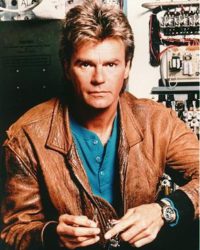
5 Life Lessons I Learned from MacGyver
Most of you may not remember the ABC television series “MacGyver” that aired between 1985 and 1992. Richard Dean Anderson played a secret agent that used his resourcefulness and knowledge of physics and chemistry to get him and others out of dangerous situations.
MacGyver was one of my favorite series growing up and I even carried a similar Swiss Army knife just in case I ended up being held prisoner by a foreign cartel.
MacGyver taught me that anything is possible if you are creative enough and resourceful enough. Here are just a few “MacGyverisms” that we can all learn from.
1. “The bag’s not for what I take, Colson – it’s for what I find along the way.” MacGyver (Pilot)
Admit it: everyone has baggage. Yes, even you have baggage. The question is why do we insist on carrying it around with us? What purpose does it serve? If you’re going to carry a bag, don’t fill it with things from the past and drag it everywhere you go. You can choose NOT to deal with that burden. Leave the past in the past. Instead, fill your bag with the sights, sounds, and emotional moments you find along the way. Carry those special moments with you to guide you, protect you, and lift your spirits. And, if one of your memories or insights helps someone else, give it to them. Free up space in your bag for new memories.
2. “Typical. Just when you’re getting ahead, someone changes the odds.” – MacGyver (Pegasus)
MacGyver was known for being creative and flexible; able to find solutions in any adverse situation. He used the objects around him as tools to help himself and others.
You have those same abilities. You need to keep an open mind, be aware of your surroundings, and take advantage of the opportunities that present themselves to you. You may not always have access to paperclips and duct tape, but with a little ingenuity, you can get out of any situation. Draw from your experience, think creatively, and trust your instincts.
3. “The great thing about a map: it gets you in and out of places in a lot of different ways.” – MacGyver (The Gauntlet)
From the science of neuro-linguistic programming or NLP, we learn that “the map is not the territory.” What that means is that we each create our own view of our world. It isn’t really the world, but rather our interpretation of our world based on our own mental filters. Our map, built up over our lifetime, shows us how to operate in our world: what is acceptable or not, what constitutes a safe place, where danger zones are located, and how to maneuver through the minefields.
My map is different from your map which is different from everyone else’s map. That explains why sometimes you do things that others don’t understand. Those things make total sense in your world according to your map. They don’t make sense to others because other people’s maps are different; they can’t apply their map to your life. That would be like using a map of New York City to navigate in Budapest.
Your map is your creation. You add to it all the time to clarify or strengthen a filter or to add new information based on experience. Whenever you are in doubt, consult your map. Trust your map to tell you what is safe or not; what is comfortable or not. If your map got you into something it can certainly point the way to get you out.
4. “Everybody makes mistakes once in a while. The trick is learning to live with it.” – MacGyver (Ugly Duckling)
If you’re reading this, it’s probably safe for me to assume you’re human. And, being human, you are prone to making mistakes; we all are. We jump to conclusions, we refuse to trust our instincts, and we generally forget to use common sense. That’s all part of being human; the lesson here is to learn to forgive ourselves. We are often more inclined to forgive others for their mistakes and yet we ridicule ourselves and belittle ourselves for being human.
The only time making mistake should be considered a failure is if we don’t learn from that mistake. When things happen, take a breath; see your mistake as an opportunity to learn and grow, and then forgive yourself and move on.
5. “Another day, a whole ‘nother set of fresh possibilities … I’m a sucker for mornings.” – MacGyver (Slow Death)
Philosophers have always told us that sunrises represent new beginnings. In books and movies, we see that when characters turn their lives around or begin a new chapter or new relationship, the imagery is backlit by a beautiful sunrise. There’s no reason we can’t use the same imagery, even if just metaphorically.
Whatever path you are on, whatever circumstance you find yourself in, remember that you have the power to change it if you choose. You can start fresh, make different choices, or end unhealthy relationships. You don’t have to wait for morning to start a new day. Just set your goals, believe in yourself, and make the conscious decision to move forward.





Add A Comment